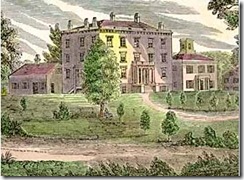Ancestors of Ohio Female College Student Visit College Hill
 College Hill became a veritable “history detective” destination when graced by the recent summer visit of two cousins in search of an 1871 poem written by their ancestor, a graduate of the Ohio Female College. Rachel Farley and Tara Musselewhite traveled from Seattle and Houston in pursuit of the valedictory poem of their 1st and 2nd great grandmother, Rachel Ann Smith. Smith was one of a handful of OFC graduates honored in the June 8, 1871, commencement ceremonies in College Hill. Her poem, entitled “A Cup of Cold Water” was part of the valedictory address, a copy of which is being sought by Smith’s descendants.
College Hill became a veritable “history detective” destination when graced by the recent summer visit of two cousins in search of an 1871 poem written by their ancestor, a graduate of the Ohio Female College. Rachel Farley and Tara Musselewhite traveled from Seattle and Houston in pursuit of the valedictory poem of their 1st and 2nd great grandmother, Rachel Ann Smith. Smith was one of a handful of OFC graduates honored in the June 8, 1871, commencement ceremonies in College Hill. Her poem, entitled “A Cup of Cold Water” was part of the valedictory address, a copy of which is being sought by Smith’s descendants.
 The College Hill Historical Society was eager to assist in this tantalizing quest. CHHS was able to extract a few folders of information on OFC compiled by the original Society in their archives (currently under reconstruction). Ed Lloyd, Society Trustee, invited the cousins to his historic home on Hillcrest Road and provided them with a custom tour of College Hill, showing them where all the schools and colleges once stood as namesakes to our beloved neighborhood. Although the poem has yet to be found, Ed did come up with an 1871 commencement program as well as an extract from the Valedictory address of Miss Rachel A. Smith, 1871.
The College Hill Historical Society was eager to assist in this tantalizing quest. CHHS was able to extract a few folders of information on OFC compiled by the original Society in their archives (currently under reconstruction). Ed Lloyd, Society Trustee, invited the cousins to his historic home on Hillcrest Road and provided them with a custom tour of College Hill, showing them where all the schools and colleges once stood as namesakes to our beloved neighborhood. Although the poem has yet to be found, Ed did come up with an 1871 commencement program as well as an extract from the Valedictory address of Miss Rachel A. Smith, 1871.
Born in 1852 on the banks of the Ohio River to a riverboat captain, Miss Smith began reading at an early age and continued her love of books throughout her childhood. She was educated by governesses, and cited a German professor in particular as influencing her education. From her autobiographical writings:
Once a week, a German Professor rode on his pony and came to stay all night [at Smith’s Landing] giving sister [older sister, and famed artist Isabel E. Smith] and me music and German Lessons. He always gave us the news from the surrounding towns, and once he brought me a puppy in his saddle bags.
At the age of sixteen, Rachel Smith began her college education in Oxford, Ohio, at the Western Female Seminary. In the fall of 1868, she began her career at the Ohio Female College. In her writings, Smith talked about two college administrators:
I want to pay a tribute to the Principal of this College, Miss Bauman. She made Philosophy a delight, and Astronomy was not merely a study of the stars, it was entering into the courts of the Creator. She not only trained out minds, but our hearts and our souls. Dr. Burt, the president of the College, was a fine scholarly Presbyterian minister who taught us the Bible and through his book, The Land and its Story, made Palestine a real place to us.
Smith’s acclaim as an honor student was evidenced by her role as President of the Somerville Literary Society during her college tenure. She was also called upon to attend to special guests visiting Ohio Female College. But her most proud moment came on her graduation day. She later recalled the day in her memoirs:
When I stood on the platform to receive by diploma, I think it was the happiest day of my life. I was wearing my first long dress, a white embroidered mull, and had received many gifts from relatives and friends who were in the audience. It was the 8th of June, 1871—a perfect day. I had taken the highest honors and had written a poem called “the Cup of Cold Water’ as my valedictory. Trustees had this poem printed and sent out to patrons, and I was invited to become the teacher of English at the College.
Rachel Smith did not accept the position, but did go on to write some articles for a Cincinnati newspaper before marrying a Pennsylvania lumberman, and leaving Ohio to raise their family. Rachel’s husband, Nelson P. Wheeler, later became a United States congressman. Rachel continued her lifelong love of education, and we are so grateful for her memoirs and legacy in College Hill.
If you have any information about the poem (maybe one of YOUR ancestors was a Trustee of OFC?), please email the College Hill Historical Society at collegehillhistory@yahoo.com.
Thanks to the College Hill Historical Society for this article.

